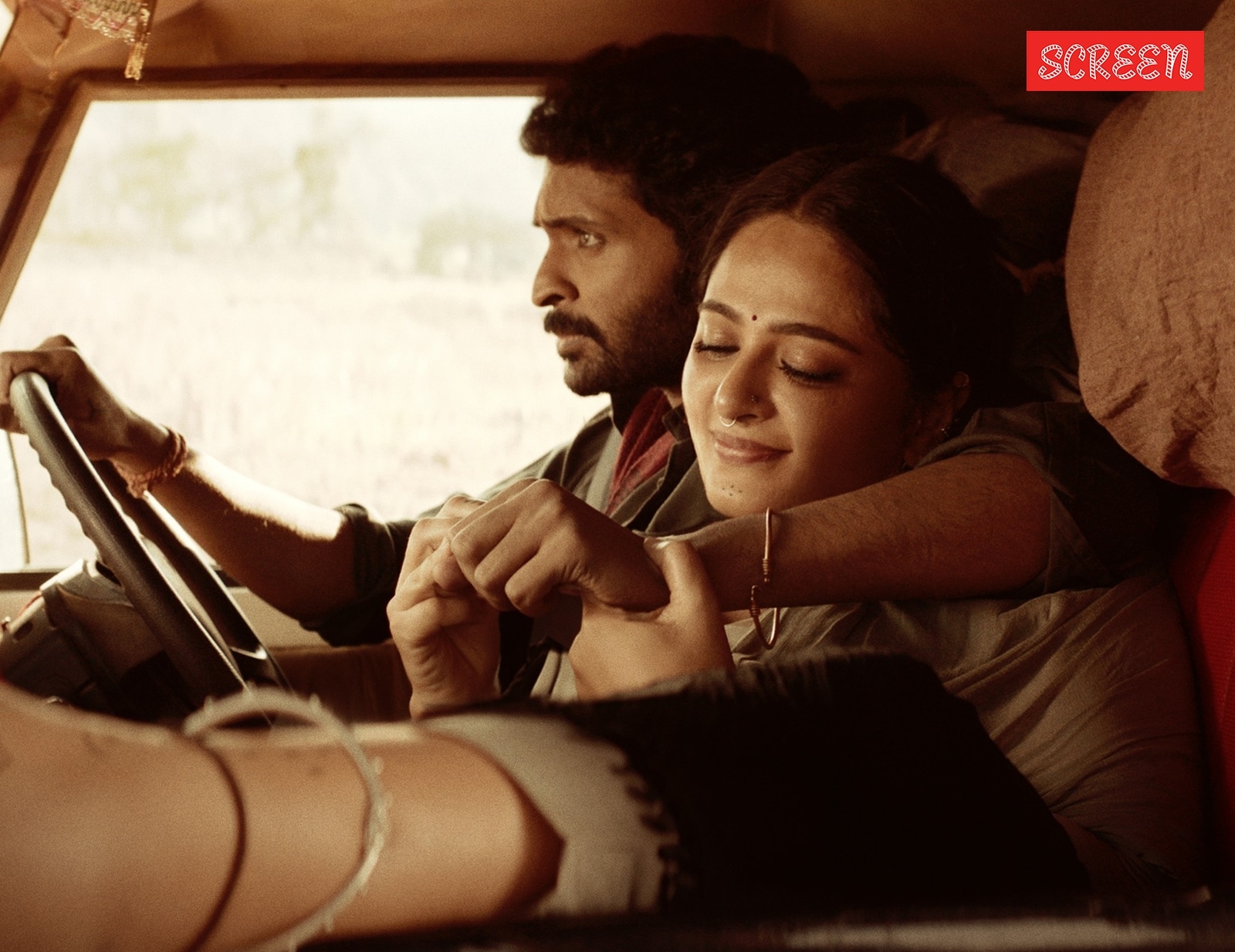Click here to follow Screen Digital on YouTube and stay updated with the latest from the world of cinema.
Ghaati Movie Review: Anushka Shetty wields vintage power in Krish’s compelling effort
Ghaati Movie Review & Rating: With Vikram Prabhu delivering a strong performance, Ghaati shines despite its many blemishes.
 Ghaati Movie Review & Rating: In the Anushka Shetty and Vikram Prabhu-starrer, the focus shifts to a new yet untapped territory of India’s Eastern Ghats. (Credit: Facebook/@FirstFrameEntertainments)
Ghaati Movie Review & Rating: In the Anushka Shetty and Vikram Prabhu-starrer, the focus shifts to a new yet untapped territory of India’s Eastern Ghats. (Credit: Facebook/@FirstFrameEntertainments)Ghaati Movie Review & Rating: There are two distinct central ideas mixed up together in Krish Jagarlamudi’s Ghaati, quite inadvertently so.
The first one, simply put, is about a revenge featuring a defiant woman named Sheelavati (Anushka Shetty) and her perpetrators comprising barbaric crime lords, a capitalistic entity and a system that could easily let them get away. The second idea is far more nuanced and layered, in which Sheelavati completes the revenge arc and realises that her true purpose is to liberate an entire marginalised community (also her home) from the clutches of evil.
It isn’t that these two ideas couldn’t coexist under the same story, but given how ambitious and keen Krish is as a filmmaker, the concern arises when he doesn’t manage to deliver equal justice to both of them. As much as he strives to make the second idea his fulcrum, the sheer density of his material (and the tone he picks for his vision) skews the focus largely towards the former, where he comes across as a lot more astute and assured. If about two-thirds of Ghaati makes for an engaging and refreshingly original ‘mass’ crime actioner, the remainder of the film feels buckled under the weight of righteousness to leave behind a patchy impression.
Social inequality and human tenacity have often been strong features of Krish Jagarlamudi’s cinema, with films such as Gamyam (2008), Vedam (2010) and Kanche (2015) enunciating the themes through a larger-than-life scope. In Ghaati, the focus shifts to a new yet untapped territory of India’s Eastern Ghats, precisely the AOB or Andhra-Odisha Border region, which is a hotbed for cannabis cultivation and smuggling at present.
Watch Ghaati trailer here:
Corporations, drug kingpins, ministers and an entire gamut of morally compromised men (and one woman) are part of this global deal, but the crux is the tribal community that has forever served as ghaatis or physical mules to these rich and mighty by putting its collective life, future and sanity on the line. The most important of the four major cannabis strains (whose potency and social impact seem slightly exaggerated) grown in the hills is Sheela’s namesake
Sheelavati, which is now being cryptically sold in liquid or oil form by a new entrant to the mix. How the bumbling bus conductor Sheela and her level-headed medical lab technician fiancee Desi Raju (Vikram Prabhu) get entangled with the malevolent overlords is only a part of the story Krish wants to tell us, with his main emphasis laid on the rise of a powerful saviour figure from within the community.
Krish, also the screenwriter (along with Chintakindi Srinivas Rao and Sai Madhav Burra for dialogues), does a fine job in building or expounding the tribal community for us, despite the restrictions of the commercial movie gaze. Cinematographer Manojh Reddy Katasani’s visuals might not take us deep inside the homes of the village that Sheela and Desi Raju hail from, but their culture, its richness and its quirks are captured without the cruel exoticization that a majority of other films are guilty of. For the writer-director, cannabis becomes a metaphor to discuss systemic exploitation and plundering of indigenous lands whose people are simultaneously relegated to the absolute margins of society. “Our Gods wanted us to grow a small batch of cannabis only as an offering, but we have overstepped unimaginably,” laments Sheela at one point, addressing her people with the status of an iron-fisted protector.
Yet, in contrast to the sophistication of the film’s theme, Ghaati’s storytelling is fairly straightforward and strikingly matter-of-fact. The narrative smoothly introduces us to its world and its players, and doesn’t make too much fuss about initiating us into the plot either. By the director’s standards, the villainy on display is over the top and occasionally overbearing because of the amount of violence (mostly made warranted) dispensed over the 156-minute runtime. But for the majority of the film’s duration, the emotional anchor feels firm in place, and the heightened tone serves well in return: the romance portion featuring Sheela and Desi Raju, too, is imbued with tenderness and a sense of trust in the viewer that not everything needs to be explained in bold.
 In contrast to the sophistication of the film’s theme, Ghaati’s storytelling is fairly straightforward and strikingly matter-of-fact. (Credit: Facebook/@FirstFrameEntertainments)
In contrast to the sophistication of the film’s theme, Ghaati’s storytelling is fairly straightforward and strikingly matter-of-fact. (Credit: Facebook/@FirstFrameEntertainments)
Krish subtly subverts gender norms, with Sheela often the aggressor and Desi Raju the more cautious, resulting in a female lead bolstered rather than overshadowed by her male counterpart. However, as much as the film belongs to Anushka Shetty for her committed portrayal, Vikram Prabhu shines in his part with a lot of conviction and never appears to be playing second fiddle. Chaitanya Rao Madadi is menacing as one-half of a psychopath duo, though the antagonism (also including Ravindra Vijay, Jisshu Sengupta, John Vijay, Larissa Bonesi, among others) lacks depth, and Jagapathi Babu’s maverick cop feels a tad superfluous. Ghaati acknowledges that a woman confronting predatory men risks becoming the target of sexual violence (with echoes of Bandit Queen) and addresses such themes without evasiveness, though it occasionally veers into crudeness, as in the needless use of the “Sheela ki Jawani” song whenever the supercop encounters Sheelavati.
The blip, though, arrives when the story reaches the second idea. It is true that a story set in the world of social exploitation cannot, and must not, walk away without dealing with the heart of the problem. Krish Jagarlamudi aspires to do that in his final act, but his good intentions do not translate well, neither in writing nor on screen. Sheela’s personality growing in stature and accepting a much bigger responsibility arrives when the film has already nearly exhausted itself with the primary revenge or good v/s bad angle, and the subsequent scenes are only burdened by a sense of closure that is both hurried and incomplete. The final 45 minutes (or so) of Ghaati do not resonate the way the previous large chunk does, and consequently, what one gets to see is a barrage of action sequences that grows tiresome with each minute.
The thumping climax perhaps does justice to the aura that Anushka Shetty carries, and the star herself wields her power with aplomb in the film. This is only her second film in the last five years, meaning that she is very careful about what she takes on, and while this one’s far from being flawless, it is certainly not forgettable.
Ghaati movie cast: Anushka Shetty, Vikram Prabhu, Ramya Krishnan, Jagpathi Babu
Ghaati movie director: Krish Jagarlamudi
Ghaati movie rating: 3 stars
Photos
- 01
- 02
- 03
- 04
- 05
































